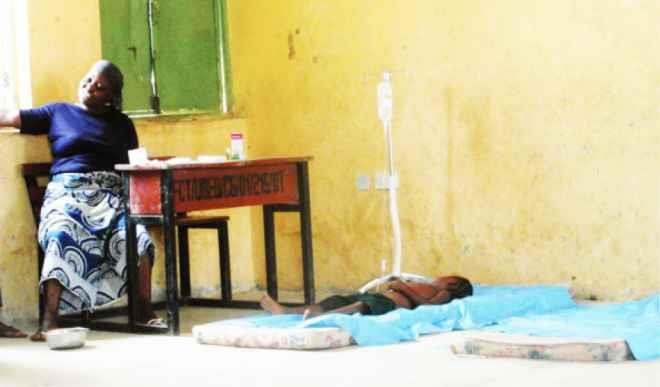Buhari’s CHIPS, coming to a community near you
Something doesn’t add up, it hasn’t for a long time. Every year, 33,000 women die from preventable causes as a result of pregnancy—the equivalent of a passenger plane crashing every day. And 940,000 children under age five die every year—that’s around 2,500 of them daily—due to preventable causes like pneumonia, diarrhoea, malaria. These are figures […]


Something doesn’t add up, it hasn’t for a long time. Every year, 33,000 women die from preventable causes as a result of pregnancy—the equivalent of a passenger plane crashing every day.
And 940,000 children under age five die every year—that’s around 2,500 of them daily—due to preventable causes like pneumonia, diarrhoea, malaria.
These are figures the National Primary Health Care Development Agency, which implements the lowest level of care in Nigeria, has been battling the numbers since the agency was formed.
“When you look at the statistics, it is very clear that we are not doing well when it comes to providing primary health care services, providing emergency management of some of these conditions,” says Faisal Shuaib, executive director of the agency in the last one year.
“A major factor that leads to these deaths is delay in the community, lack of health facilities close to people, or because they cannot afford it.”
Enter CHIPS—Community Health Influencers and Promoters Service—the intervention President Muhammadu Buhari launched on at a primary health centre on a state visit to Nasarawa last week.
It is the second time he has launched a health intervention at a primary health centre; the first was a bold move to revitalise primary health care, including renovating 10,000 centres, starting with one in Kuchingoro, an inner-city slum in Abuja.
Dr Faisal Shuaib, executive director, NPHCDA
What is Chips, how does it work?
CHIPS isn’t exactly new. What it is doing is consolidating an approach to community health workers that has been “fragmented and poorly coordinated,” explains Shuaib.
Village health workers, volunteer community mobilisers, traditional birth attendants are all cadres of “health workers” sponsored by different development partners. Their requirements, emoluments and expectations differ.
In all, they could number up to 25,000 but still far short of the scale of health workforce Nigeria needs.
Under CHIPS, they all come together as “agents”.
“We want to be more rigorous, we want to set a bar below which we will not accept for Nigerians. Nigerians deserve better and it is possible to upscale them,” says Shuaib.
The minimum is elementary education, followed by up to three months training upon selection but CHIPS agent will undergo the same programme from Issele-Uku, Delta to Potiskum, Yobe.
What Buhari launched is only a pilot, but he’s directed the federal health ministry to ensure CHIPS rolls out across the country. In the next two years, that could mean up to 200,000 agents working in their communities and bringing health care to the doorsteps of fellow residents.
Agents are the embodiment of the “where there is no doctor”. They are responsible for basic interventions in the community. CHIPS work out of an assigned kit, containing anything from supplies to treat injuries and rapid diagnosis kits to test for malaria to over-the-counter medicines to treat common ailments. All are free, of course, but CHIPS have a responsibility to send their “patients” to the nearest health facility, never to usurp the role of a health facility worker.
The framework of CHIPS has “zero tolerance for [agents] trying to manage disease conditions beyond their training,” says Shuaib.
“Most of their role will be to influence decision making processes. If somebody is sick, instead of waiting till complications arise, they would quickly take the decision to go to the health facility.”
Community health extension workers—commonly called CHEWs and Junior CHEWs—have “extension” tacked onto their role for a reason. Their job involves extension, reaching communities with health messages.
“Because of the paucity of human resource to work in the facilities, you find a situation where CHEWs and JCHEWs will spend most of their time in the health facility, and that part of their work that requires them to come to the community and do community extension has been relegated to the background, and that is the gap the CHIPS agents are filling,” Shuaib.
It sounds typically familiar to the Midwives Services Scheme, a programme by NPHCDA to send trained midwives into underserved communities. It required federal, state and local governments to pay certain amounts in stipends to the midwives, but it floundered when the parties couldn’t keep to their parts of a memorandum.
For CHIPS, federal government handles training and policy direction. States handle stipend—and that could be anything from raw cash to the recognition that it is an achievement to be selected an agent. And local government will supervise CHIPS in their wards.
The federal government has appropriated nearly N1.4 billion in 2018 budget, and proponents of the intervention are optimistic lawmakers have been so wowed by CHIPS that allocation in 2019 budget would increase at most or remain steady at least.
Present governors wanting to leave some sort of legacy—providing emergency intervention and basic health care to people who ordinarily couldn’t get it—are already whispering about CHIPS.
NPHCDA is in talks with Jigawa. It has had previous talks with Kebbi, Sokoto, Bauchi and Bayelsa, says Shuaib.
“But it has to be contextualised in a way that they can sustain on their own based on resources available to the state,” he explains.
“People are excited about the huge impact this will make at the community level.”
That’s why the mortality and morbidity figures are worrisome, and CHIPS agent are going to the sources of the numbers.
“This is another bold step the federal government is taking toward providing equitable primary health care to our communities. Years down the line, we are going to look back and say we did the right thing when it came to keeping our promise to provide primary health care to each and every Nigerian.”
